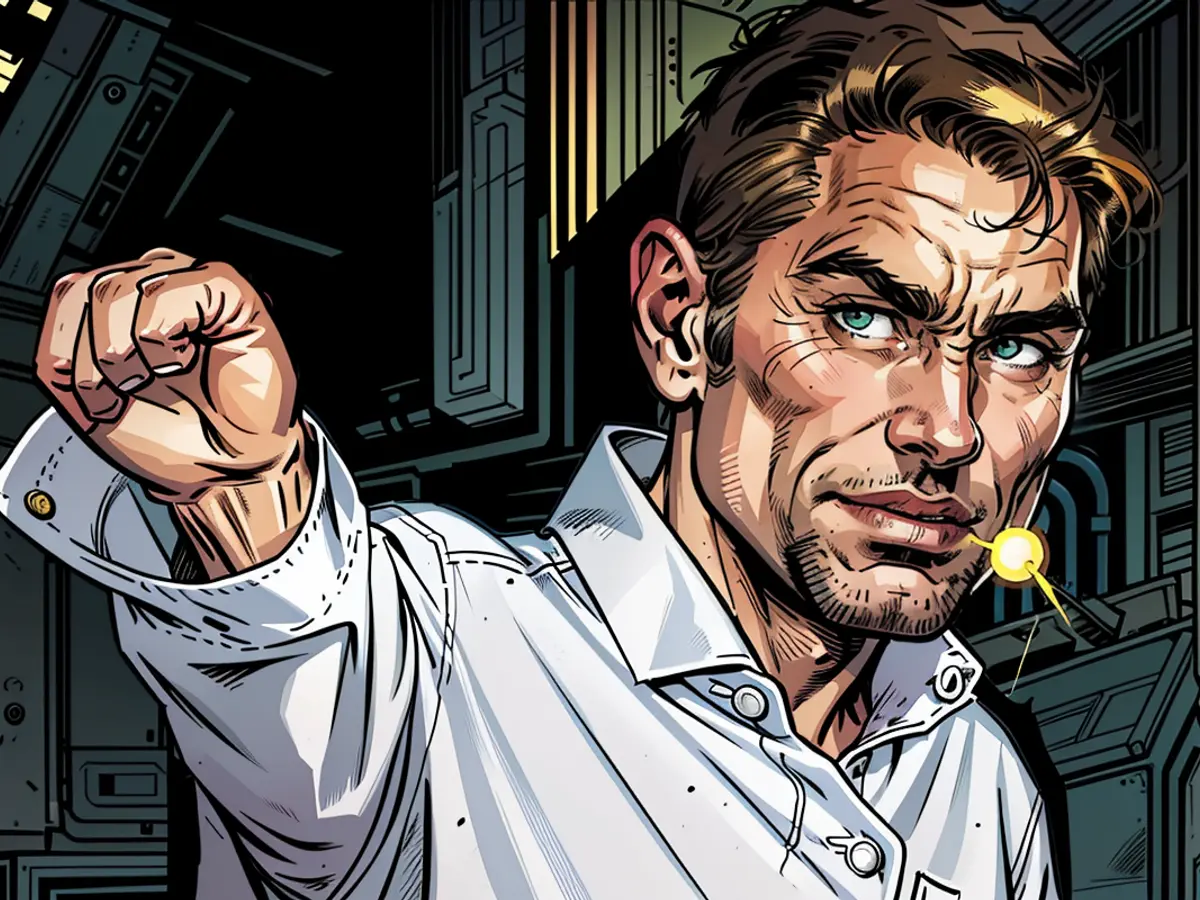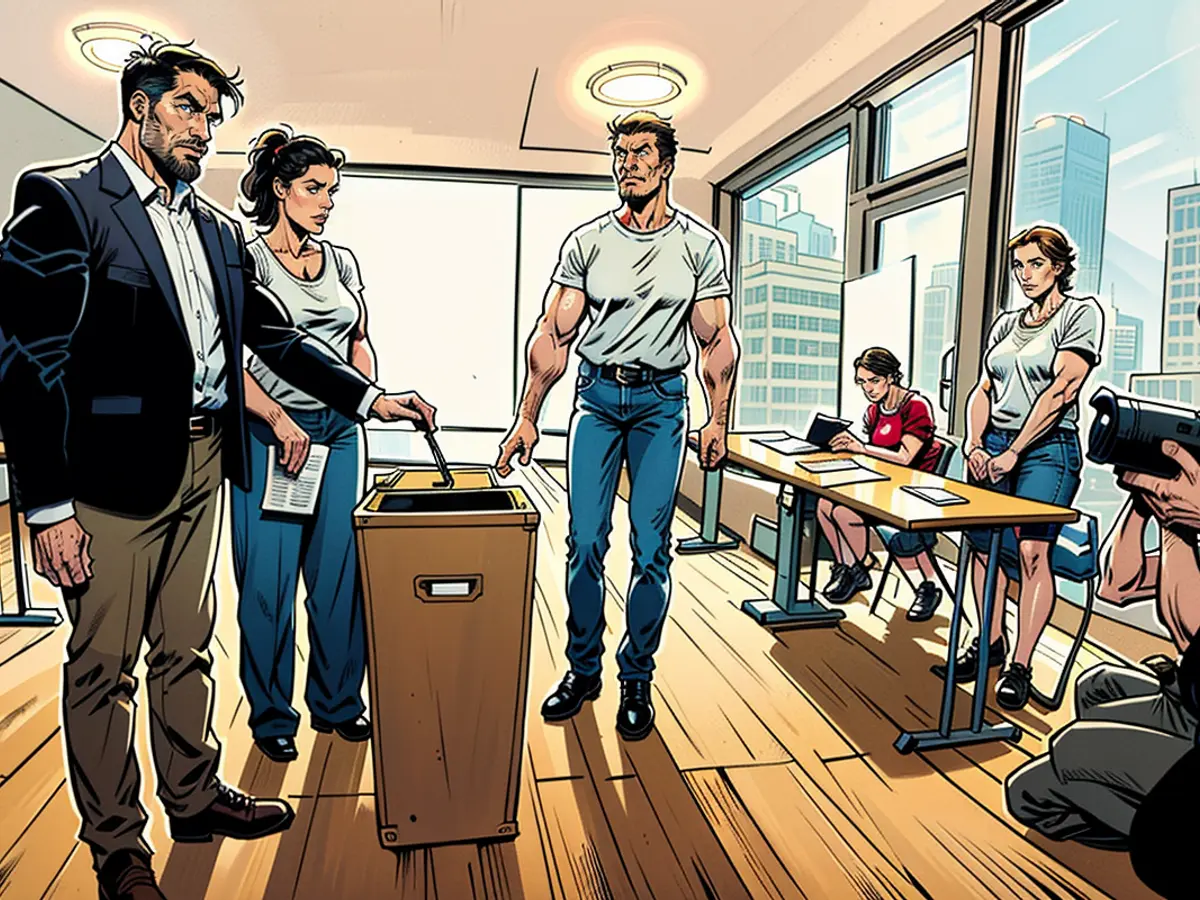A scholarly expert in politics believes that a minority government could arise in Saxony.
00:10 Government Formation in Erfurt: Ramelow Offers Voigt AssistanceThuringia's President Bodo Ramelow agrees to offer assistance to CDU's leader Mario Voigt in establishing a majority government within the Erfurt parliament. "We require a functional state government, despite my absence from it," Ramelow mentioned to Phoenix TV. He aims to support "the individual who has the public's mandate to construct a majority government within the democratic spectrum, which in this instance is Mr. Voigt." He does not oppose BSW or CDU. "My battle is against the normalization of fascism." Consequently, he seeks to ensure "that we do not encounter a parliamentary blackmail situation where the AfD manipulates all other parties."
23:30 Höcke Secures Seat in Thuringian Parliament through State ListThe AfD successfully gained victories in 29 out of 44 electoral districts. Their faction leader Björn Höcke, however, lost to CDU politician Christian Tischner in the Greiz II electoral district. Nonetheless, with AfD's robust secondary vote result of 32.8%, they will be able to claim more seats in the state parliament than direct candidates. Höcke, who leads the state list, will thus secure a seat in the parliament. If a successful AfD candidate had chosen to forfeit their mandate, Höcke would have claimed it instead.
23:01 Preliminary Result: AfD Triumphs in Thuringia, CDU Ponders Coalition with Left, Greens and FDPIn Thuringia's historical first, the AfD has acquired the most votes in a state election. The party, led by top candidate Björn Höcke, recorded a significant improvement of 32.8% after every district's counting. However, they are unable to fulfill their pledge for government, as no democratic party will agree to a coalition with them. The CDU, as the second strongest force, will likely need to engage in talks with the Left for a stable government coalition. A majority with the SPD and BSW is impossible due to a missing seat.
22:51 Left Party Represents Saxony in Parliament Despite Direct MandatesThe Left Party has secured two direct mandates in Leipzig, allowing them access to the state parliament despite failing to surpass the 5% threshold, according to projections. This event leaves the incumbent coalition of CDU, Greens, and SPD without a majority, as per projections.
22:38 Green Party Leader: Migration and Ukraine Drive Election ResultsGreen Party leader Omid Nouripour attributes the state elections' results in Saxony and Thuringia to the issues of migration and Ukraine. "Clearly, migration and the controversy surrounding Ukraine played a significant role in the final stages," Nouripour remarked to Phoenix TV. While the federal government grapples with these problems, "we have a disadvantage due to this coalition's self-sabotage through undue infighting in the public eye."
22:22 Thuringia: Even with CDU, BSW, and SPD, no majority at presentSince Thuringia's minority coalition of red, red, and green under President Ramelow has reached its conclusion, no party is keen to forge a coalition with the AfD. The most plausible option for a government coalition appears to be an unconventional alliance between CDU, BSW, and SPD. However, according to current projections (as of 22:10), this setup falls short of a majority in the state parliament. Consequently, it would also rely on The Left.
22:10 CDU's Top Candidate Voigt Falls Short of Direct Mandate in ThuringiaCDU's top candidate Mario Voigt failed to secure a direct mandate in his constituency during the Thuringia election. He garnered 37.4 percent of the first votes in Saale-Holzland II, while AfD candidate Wiebke Muhsal secured 39.2 percent. In 2019's state election, Voigt was elected to the state parliament as a direct candidate.
21:44 Young Voters in Thuringia Select AfDMore than a third of young voters in Thuringia opted for the AfD, a party classified as extreme right-wing by the domestic intelligence agency. This is the outcome of a survey conducted for ARD by infratest dimap. According to the survey, 38 percent of 18-to-24-year-olds in Thuringia voted for the AfD. The Left garnered 16 percent, the CDU 13 percent, and the Greens acquired only 6 percent of the votes.

In Saxony, recent projections from ARD and ZDF demonstrate a clear lead for the CDU, outpacing the AfD. According to Infratest Dimap (ARD) and the Forschungsgruppe Wahlen (ZDF), the CDU holds around a 1% edge, garnering 31.5 to 31.8% compared to the AfD's 30.4 to 30.8%. Initially, Forschungsgruppe Wahlen's projection suggested a close race between the CDU and AfD, with the AfD closing the gap on the CDU's narrow advantage. However, ARD's projections consistently showed the CDU maintaining a clear lead.
Sadly for the Left in Thuringia, they have suffered major losses in the state elections, meaning Minister President Bodo Ramelow may be forced to step down. One of his ambitions might not be realized tonight: Ramelow had hoped that the AfD would not garner at least a third of all votes. It seems they have, potentially hindering decisions with a two-thirds majority.
Federal Chancellor Olaf Scholz can still count on the support of his party, SPD, despite the dismal results in Thuringia and Saxony elections, according to SPD leader Lars Klingbeil. Speaking to ZDF, Klingbeil said, "And I also want to say as the federal chairman of the party, I expect everyone to now work even harder than they have been." All must contribute to regaining voter support, Klingbeil added.
FDP deputy leader Wolfgang Kubicki has criticized the federal coalition after the lackluster performance of the "traffic light" parties in Saxony and Thuringia elections. "The election result demonstrates: The traffic light coalition has lost its legitimacy," Kubicki asserted on "X". If a significant portion of voters reject it in this way, it must have consequences. People have the impression that "this coalition is harming the country," Kubicki expressed. The FDP has failed to clear the 5% hurdle in both state elections and is currently polling at just over 1%.
The district of Greiz II, where AfD faction leader Björn Höcke is vying for a seat, has been assessed: Höcke has failed to secure the required majority of votes to enter the Thuringia state parliament directly. Nevertheless, according to ntv data, the party will secure Höcke's seat in the state parliament by having one of its members step down in his favor.
Despite significant losses, the Left appears set to secure a place in the Saxony state parliament. Although it did not surpass the 5% threshold with second votes, currently standing at 4.3% according to the latest ZDF projection, two Left direct candidates in Leipzig constituencies hold comfortable leads over their competitors. Two direct mandates would guarantee the Left at least a few seats in the new state parliament. The two potential winners could also secure a seat for the heads of their party's state list, meaning the current CDU-SPD-Green coalition would not possess a majority - Minister President Kretschmer would need the BSW for a governing majority.
According to the latest exit poll on ZDF, the CDU in Saxony has a slim lead of 0.1% over the AfD. The Christian Democrats are at 31.5%, while the AfD, classified as right-wing extremist by the domestic intelligence agency, is at 31.4%. In Thuringia, the AfD has reportedly outpaced the CDU in exit polls. The Greens are currently at 5.1% in Saxony and risk losing their seats in parliament. The Left has a narrow chance with an estimated 4.3%, while the SPD is secure in the state parliament with 7.6%.

AfD faction leader Björn Höcke's direct entry into the Thuringia state parliament faces uncertainty. With 68 of 74 constituencies counted, the CDU candidate Christian Tischner enjoys a 2.3% margin over Höcke, with 42.3% of the votes versus Höcke's 40.4%. If Tischner secures the majority of votes in the Greiz II constituency, Höcke will not earn a direct seat. Instead, he would rely on a seat in parliament via the state list, which he heads. However, if many AfD candidates are successful as direct candidates, nobody would enter parliament via the state list.
According to Höcke, the AfD's victory in Thuringia signifies the failure of the "firewall policy." He described the election outcome as an "historic achievement" and discussed the upcoming government formation.
19:42 Ramelow: Left Party "Devoured"Thuringia's Minister President Bodo Ramelow attributes the "devouring" of his Left Party to two factors: "Firstly, a CDU that persistently equated the AfD and the Left, constantly pointing the 'exclusion finger' at us, despite sharing power with us for five years," Ramelow stated on ntv. He also pointed to a BSW poll that predicted the AfD would garner 17 percent of the vote but ended up taking votes from the Left. Ramelow could take solace in the high voter turnout.
19:26 Nouripour on AfD's Triumph: "My Sympathies Lie with Those Who Fear"The AfD is surpassing 30 percent in both Saxony and Thuringia, leaving the coalition parties in their wake. Green Party leader Omid Nouripour views the AfD's election result as a "turning point" and a call to defend democracy together.
19:08 Wagenknecht Eyeing Coalition with CDU and Potentially SPD in ThuringiaBSW chair Sahra Wagenknecht aims for a coalition with the CDU and potentially the SPD in Thuringia. "We're hoping to successfully form a good government with the CDU - likely also with the SPD," Wagenknecht said on ARD. After five years of minority government, the people yearn for a stable majority government. This government should address issues such as "the significant teacher shortage" in Thuringia, the BSW chair demanded. People also desire a state government that "speaks up in federal politics" - a government that, according to Wagenknecht, "champions peace, diplomacy" and opposes the deployment of US missiles in Germany. A coalition with the AfD was definitively ruled out by the party leader for Thuringia.
19:02 Thuringia Forecast: AfD's Success ExpandsA ZDF forecast for the Thuringia election result suggests that the AfD's success is even more pronounced than initially anticipated. According to this, the right-wing extremists are securing 33.1 percent of the votes in the federal state. The CDU is at 24.3, Sahra Wagenknecht's alliance is at 15 percent. The Left, which currently has Bodo Ramelow serving as - popular - Minister President, is losing almost 8 percentage points and stands at 11.7. The SPD is at 6.6, the Greens at 4 percent of the votes.
18:56 Göring-Eckardt: AfD's Triumph Is a Sting in Germany's SidePoliticians from the Green party are more unsettled by the AfD's success in Thuringia than by their own election setbacks. Katrin Göring-Eckardt, the Green party's co-chair, sees the victory of the right-wing extremists as a "sting" in Germany. Party leader Omid Nouripour feels his party's disappointment in their poor performance is "insignificant" in comparison to the AfD becoming the strongest force in a state parliament.

18:48 Kretschmer on Saxony: "We Have Every Reason to Celebrate"The incumbent Saxon Minister President Michael Kretschmer views the CDU as the cornerstone of the government coalition. "We have every reason to celebrate," Kretschmer said at his party's election celebration. "We've endured five challenging years," during which the people of Saxony put their trust in the CDU instead of casting a vote of protest. "We're well aware of how disappointed people are with what's happening in Berlin."
18:39 Projection for Saxony: CDU's Lead over AfD NarrowsPreliminary projections on ZDF suggest that the CDU's lead over the AfD in the Saxony state election is narrowing: The CDU now enjoys a very narrow advantage over the AfD with 31.9 to 31.3 percent of the votes cast. The BSW is at 11.6 percent, the SPD at 7.8. The Greens would just manage to enter the state parliament with 5.2 percent, while the Left would miss the mark with 4.5 percent.
18:33 Weidel Declares Government Participation for AfD in Thuringia and SaxonyAfD federal party chair Alice Weidel is advocating for government participation for her party in Thuringia and Saxony. "Under usual circumstances, adhering to the customs in this country, the strongest party - which is the AfD - would be exploring collaborations," Weidel says in ARD, referring to Thuringia. "The voter desires the AfD to participate in the government. We represent 30 percent of the voters in both federal states, and without us, a stable government would not even be feasible."
18:30 SPD Secretary-General: "We Faced the Risk of Being Ousted from the State Parliament"SPD secretary-general Kevin Kühnert acknowledges his party's modest results in the elections in Thuringia and Saxony. "It's not a night to rejoice for the SPD," he said in ARD. The party has been struggling for years. "There was a genuine risk of being eliminated from the state parliaments," Kühnert said. "Fighting is worthwhile, we're necessary." A lot needs to change, Kühnert said, mentioning a need for more communication and listening to voters. When asked about Chancellor Olaf Scholz, he said, "We have to explain our politics collectively."
18:23 Höcke Celebrates Thuringia Victory as "Significant Triumph"AFD parliamentary group leader Björn Höcke views the Thuringia result as "significant." The AFD is the most popular party among the people in the federal state, "the unnecessary obstacle talk needs to halt," Höcke stated in MDR. Change will only occur with the AFD, he added.
18:21 Chrupalla on Thuringia: "Tied with the CDU"AFD party leader Tino Chrupalla views his party's result as remarkable, stating that the people's will is a shift in politics in both federal states. The AFD is open to talks with all parties, Chrupalla said in ZDF. "In Saxony, we are neck and neck with the CDU," the AFD aims to make politics for the betterment of Saxony, he said.
18:17 CDU Secretary-General: No Coalition with AFDCDU secretary-general Carsten Linnemann has ruled out coalitions with the AFD in Thuringia or Saxony. "We are absolutely clear about that," he stated in ARD. The CDU will now form governments from the center of the parliament, he said. He is confident that this will be successful. The CDU is the last remaining popular party, the traffic light parties have suffered, he added.

18:13 Projection for Saxony: CDU Slightly Ahead of AFD, BSW at 12 Percent, Greens on the BrinkAccording to the first projection for the Saxony state election, the CDU would emerge as the winner with 31.5 percent of the votes cast. It would barely lead the AFD with 30 percent. The BSW would be the third strongest force with 12 percent, the SPD would remain in the state parliament with 8.5 percent. The Greens would just make it into the state parliament with 5.5 percent. The Left would be out with 4 percent, and the FDP would not be in the new parliament.
18:10 Projection for Thuringia: AFD Leads over CDU, BSW Gains 16 PercentThe first projection for the state election in Thuringia indicates a clear lead for the AFD with 30.5 percent of the votes, followed by the CDU with 24.5 percent and the Left with 12.5 percent. The SPD would enter the state parliament with 7 percent, while the BSW would secure a seat with 16 percent. The Greens and the FDP would both fall short of the 5 percent threshold.
18:01 AFD Strongest in Thuringia, BSW Achieves Double Digits in SaxonyAccording to the first projection after the state election in Thuringia, the AFD emerges as the strongest force, with the SPD clearing the 5 percent hurdle. The Greens and the FDP remain below this threshold. In Saxony, the BSW achieves a double-digit result from scratch. The CDU is narrowly ahead of the AFD. According to the projection, the Left and the FDP would not be represented in the state parliament, while the Greens would remain.
17:18 Höcke May Miss Out on State ParliamentAFD faction leader in Thuringia, Björn Höcke, does not have a guaranteed seat in the future state parliament. His successful party colleagues could even prevent him from entering. Many AFD candidates have good chances of winning a direct mandate in their constituencies. However, Höcke faces strong competition from CDU candidate Christian Tischner in his constituency of Greiz II. If Tischner wins and the AFD wins more direct mandates than they are entitled to from the second vote results, no one can enter via the state list, not even from the top spot, which Höcke holds. In this case, the AFD could try to convince a successful direct candidate to relinquish their seat in the state parliament, allowing the faction leader to secure his mandate.
16:48 AFD Thuringia Plans to Celebrate without Media CoverageThere is unlikely to be any media coverage of the AFD's election celebration in Thuringia. The party, classified as right-wing extremist by the Verfassungsschutz, attempted to exclude several media outlets from the event, but a court prevented this. Consequently, the state party excluded the entire press, citing organizational problems: there was not enough space at the event location for all the accredited media representatives.
16:29 Nearly a Quarter Voted by Mail in SaxonyFor the election that Saxony's CDU Minister-President Michael Kretschmer described as a "crucial election" for the state, nearly a quarter of eligible voters have already cast their ballots by mail. The state election office expects 24.6 percent of voters to have voted by mail. The voter turnout today was only slightly higher than in 2019 at the early afternoon.
15:52 Höcke Casts Vote in a Lada - Ramelow with His WifeThuringia's AFD state leader and top candidate, Björn Höcke, cast his vote this morning. He arrived at his polling station in Bornhagen, Eichsfeld district, in a Lada Niva, a Russian-made off-road vehicle. Minister-President Bodo Ramelow voted in the state capital of Erfurt, accompanied by his wife, Germana Alberti vom Hofe. Ramelow, 68, has been the state's head of government since 2014, most recently leading a minority coalition.

15:40 Voter Participation Surpasses Last Time's MarkIn Thuringia, 44.4% of voters had already voted by 2 PM, which is a greater percentage compared to the election held 5 years ago. The increase is around 2.1 points. This indicates a high turnout. Postal votes are yet to be accounted for, as per the state election commissioner. In Saxony, turnout was at 35.4% by 2 PM, only slightly higher than in 2019. However, the election commissioner anticipates more postal votes than in 2019. Polling stations in both states will close at 6 PM.
15:13 Kretschmer Hopes Coalition Parties Make it to State Parliament
14:40 Key Issues for Saxony and ThuringiaApproximately 30% of people in Saxony and Thuringia are planning to vote for the AfD in the upcoming September 1st elections. A large survey reveals the major concerns and problems leading to this preference. Topics such as migration are just one of the reasons.
14:13 Höcke Skips Speaking with Journalists at Polling StationThuringia's AfD top candidate, Björn Höcke, cast his vote around noon. He didn't stick around at the Bornhagen polling station or speak to journalists present at the site. Höcke previously lost to the CDU candidate in his home constituency of Eichsfeld, but he shifted to the Greiz constituency for this election, only to face another potential defeat against the CDU.
13:50 Voter Turnout in Thuringia Similar to 2019 at MiddayThuringia's voter turnout matches the turnout in the 2019 parliamentary elections by noon. According to the state election commissioner, around 32% of eligible voters had cast their ballots in polling stations by 12 PM. The numbers do not include postal voters. The voter turnout in 2019 was also 31.2% at this time. There seems to be increased interest in the state election compared to the European and local elections held this year. In June, the voter turnout was 24.3% at the same time.
13:29 High Voter Turnout Expected in SaxonySaxony's state election anticipates a high voter turnout. By midday, 25.8% of eligible voters had cast their ballots, as reported by the Statistical State Office in Kamenz. This is only slightly less than the 2019 state election's figure of 26.2%. Postal voters are not yet included in the preliminary figures. Strategists expect that 24.6% of eligible voters will exercise their right to vote by post, compared to 16.9% in 2019. The state election commission reports that the polls are running smoothly in the morning without any disruptions.
13:11 Von Lucke Expects Berlin Coalition's WeakeningThe results of the state elections in Saxony and Thuringia have not yet been announced. If the SPD does not make it to the state parliament, political scientist Albrecht von Lucke thinks this would "almost already be an earthquake," as he puts it in an ntv interview. He discusses the election's implications and its likely consequences.

12:44 Police Investigate Threat at Polling StationA man wearing an AfD T-shirt entered a polling station in Gera, causing a threat. According to the police spokesperson, the polling station manager requested the man to remove his shirt because party advertising was forbidden within the polling station. Although the man complied, he threatened to return after being unsatisfied with how he was treated before leaving the premises. The police then filed a report and reprimanded the man. Furthermore, police in Erfurt are investigating possible vandalism ("Höcke is a Nazi") near polling stations.
12:15 Correctiv Warns Against Circulating False InformationResearch network Correctiv is warning about a recycled false claim that has been gaining popularity once again. The claim insists that signing the ballot protects against electoral fraud. However, the Federal Returning Officer's office clarified that the ballot may not be signed. Signing increases the risk of revealing the voter's identity, rendering the entire ballot invalid.
11:51 Voigt Hopes for "Stable Majority Relations"Thuringia's CDU top candidate Mario Voigt has also cast his vote. Voigt expressed his hope that "many Thuringians go out and vote, exercising their right to determine the future of our land." He also expresses his hope for "stable majority relations" that will help move the country forward.
11:25 Sonneberg Experiences a Surge in Far-Right AggressionSince Sonneberg became the first district in Germany to be led by an AfD politician, engaged individuals have reported being severely threatened, leading several to quit their jobs. The number of far-right attacks has reportedly increased fivefold in the past year. Experts associate this surge in aggressions to the AfD district administrator.
10:57 Kretschmer Discusses Importance of State's Parliamentary ElectionSaxony's Prime Minister Michael Kretschmer views the state parliamentary election as "probably the most important election in 34 years." While voting in Dresden, he expresses his gratitude to those who "chose differently" in the past but have now chosen the "strong force in the bourgeois center," referring to the Saxon Union. In recent polls, Kretschmer's CDU is neck and neck with the AfD.
10:30 Ramelow: Wagenknecht "Won't Be an Option" For Thuringia's Minister President Bodo Ramelow, election day is a "celebration of democracy," despite the possibility of not being re-elected. In an interview with ntv, the Left Party politician explains why he discourages a minority government and questions the ability of the BSW.
09:59 "Historical Misgivings": Historian Criticizes Election Date Historian Peter Oliver Loew criticizes the election date for the state elections in Saxony and Thuringia on the 85th anniversary of the German invasion of Poland in 1939. "Anyone who thought it was a good idea to hold elections on September 1st had doubts about history," the director of the German Polish Institute told the editorial network Germany (RND). Regarding the AfD, classified as "unequivocally right-wing extremist" by the domestic intelligence service in both states, Loew stated, "This can lead to negative associations if in Dresden and Erfurt, a party also wins, whose relationship to the Nazi era is unclear."

09:30 "Crucial Election": All Data for Saxony State Election Over 3.3 million eligible voters in Saxony have the chance today to decide who will shape the political direction of the Dresden state parliament in the future. The CDU could relinquish its position as the strongest force in the state for the first time since 1990. Saxony's Minister President Michael Kretschmer refers to this as a "crucial election." "Everything is at stake here."
09:05 Kretschmer Accuses Traffic Light Government of "Pre-Election Chaos" It's election day in Saxony, and the question is: Will Minister President Michael Kretschmer extend the CDU's winning streak in the state? In an interview with ntv, he discusses his position on the refugee debate, the traffic light government, and the Ukraine war.
08:46 All Data for Thuringia Election Time for decisions: In the heart of Germany, it's about determining who will govern the federal state with its approximately 2.1 million inhabitants for the next five years. Will the AfD, led by Björn Höcke, become the most powerful force in Thuringia?
08:24 How the AfD Could Undermine Democracy Polls indicate: The AfD is likely to significantly expand its influence in the upcoming elections in Saxony and Thuringia. For democratic institutions, this is risky, as a research group has pointed out due to the perception of a weaker rule of law than many assume.
08:00 Polling Stations in Thuringia and Saxony Open Today, new state parliaments are being elected in Thuringia and Saxony. In the polls, the AfD is leading in Thuringia. In Saxony, the CDU led by state leader Michael Kretschmer and the AfD are neck and neck. Initial forecasts will be released following the closing of polling stations at 6 pm. The elections in these two eastern German states also serve as a barometer for the traffic light coalition in Berlin.
For the current red-red-green coalition of Minister President Bodo Ramelow (Left) in Thuringia, no majority is predicted in the polls. The possibility of a coalition consisting of CDU, Sahra Wagenknecht's (BSW) alliance, and the SPD exists after the election. In Saxony, it's unclear whether the current coalition of CDU, SPD, and Greens still holds a majority. Kretschmer does not rule out an alliance with the BSW. The Left risks being expelled from parliament in Saxony. The same fate could befall the Greens and FDP in Thuringia.
The Left Party in Thuringia may not have secured a majority of direct mandates, but they still have the chance to represent the state in parliament due to securing two direct mandates in Leipzig.
Despite failing to gain a direct mandate in Thuringia, Björn Höcke, the leader of the AfD's state list, will secure a seat in the Thuringian parliament as a result of the party's robust secondary vote result.









